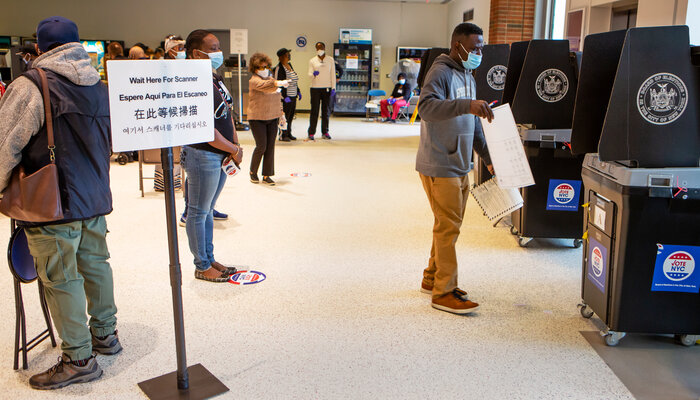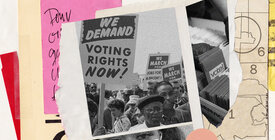Voting Laws Roundup: May 2021
States have already enacted more than 20 laws this year that will make it harder for Americans to vote — and many legislatures are still in session.

Editor’s note: A more recent snapshot of state-level voting laws — both expansive and restrictive — can be found here.
Across the country, the effort to restrict the vote continues, with a wave of bills moving through state legislatures and becoming law.
Between January 1 and May 14, 2021, at least 14 states enacted 22 new laws that restrict access to the vote.footnote1_vOLd9Nj7BCPB4vrSwAHp-Gg1O8Rz88F1QCYfStRg9po_k9xeiSK1voEk1 Provisions are categorized as restrictive if they would make it harder for Americans to register, stay on the rolls, and/or vote, as compared to existing state law. The United States is on track to far exceed its most recent period of significant voter suppression — 2011. By October of that year, 19 restrictive laws were enacted in 14 states. This year, the country has already reached that level, and it’s only May.
End Notes
-
footnote1_vOLd9Nj7BCPB4vrSwAHp-Gg1O8Rz88F1QCYfStRg9po_k9xeiSK1voEk
1
Provisions are categorized as restrictive if they would make it harder for Americans to register, stay on the rolls, and/or vote, as compared to existing state law.
UPDATE
As of June 21, 17 states enacted 28 new laws that restrict access to the vote. With some state legislatures still in session, more laws will certainly follow, which we will track in the next roundup later this year.
More restrictions on the vote are likely to become law, as roughly one-third of legislatures are still in session. Indeed, at least 61 bills with restrictive provisions are moving through 18 state legislatures. More specifically, 31 have passed at least one chamber, while another 30 have had some sort of committee action (e.g., a hearing, an amendment, or a committee vote). Overall, lawmakers have introduced at least 389 restrictive bills in 48 states in the 2021 legislative sessions.
The restrictive laws from 2011 were enacted after the 2010 elections brought a significant shift in political control over statehouses — and as the country confronted backlash to the election of its first Black president. Today’s attacks on the vote come from similar sources: the racist voter fraud allegations behind the Big Lie and a desire to prevent future elections from achieving the historic turnout seen in 2020.
Americans’ access to the vote is in unprecedented peril. But Congress can protect it. The For the People Act, passed by the House and now awaiting action in the Senate, would block many of the state-level restrictions that have been or may soon be enacted into law.
At the same time, at least 880 bills with expansive provisions have been introduced in 49 states.
You can find a resource listing restrictive and expansive state voting legislation by bill number here.
Restrictive Bills
Bills Enacted into Law
In a backlash to 2020’s historic voter turnout and unprecedented vote-by-mail usage, state lawmakers have imposed a variety of significant restrictions on both mail voting and in-person voting. Florida, Georgia, and Iowa have each used single omnibus bills, which incorporate many restrictions, to undertake a full-fledged assault on voting. By contrast, Arkansas and Montana lead the country in the number of restrictive bills enacted (four each), each of which addresses a narrower range of issues. Laws enacted in Arkansas, Florida, Georgia, Iowa, and Montana are already being challenged in court.
At least 16 mail voting restrictions in 12 states will make it more difficult for voters to cast mail ballots that count.
At least 8 states have enacted 11 laws that make in-person voting more difficult. Three states have enacted four laws that impose new or harsher voter ID requirements for in-person voting.
Restrictive Bills That Are Moving
As of May 14, 2021, there are at least 61 bills with restrictive effects moving through 18 state legislatures, in addition to the bills that have already become law.
At least 32 moving bills in 15 states would restrict the ability to vote by mail.
At least 15 bills moving in 10 states would impose new or stricter voter ID requirements.
At least 14 bills moving in 6 states would expand voter purge practices in ways that risk improper removals.
At least 11 bills moving in 6 states would increase barriers to voter registration.
Expansive Bills
Bills Enacted into Law
Despite the wave of voter suppression efforts in 2021, some states have enacted legislation to make it easier for Americans to access the ballot box. These laws are focused on expanding early voting, making mail voting easier, and improving accessibility for voters with disabilities. Virginia has enacted nine expansive bills this session, the most of any state.
At least seven laws would expand the availability of early voting. For example, New Jersey and Kentucky codified in-person early voting, and Massachusetts extended early voting through June of this year.
And at least eight laws in six states make mail voting easier.
At least six states have enacted eight laws that seek to make voting more accessible for voters with disabilities.
Expansive Bills That Are Moving
As of May 14, 2021, there are at least 115 bills with expansive provisions that are moving across 25 states, in addition to the bills that have already become law. New York has 20 moving bills with expansive provisions, the most of any state.
More than half of the expansive bills that are moving would make it easier to vote by mail. There are 59 moving bills across 20 states that would make it easier to obtain and return a mail ballot and have that ballot counted. Thirteen bills would expand the availability of ballot drop boxes.
There are 32 bills moving in 16 states that would expand voter registration opportunities.
There are 25 bills moving in 11 states that would establish or expand early voting.
There are 10 bills moving in five states that would restore voting rights for those with past convictions.
Alarming Trends
In addition to new legislation that will make it harder for Americans to vote, state lawmakers have enacted several other policies that risk undermining the voting process.
For example, a previous Brennan Center analysis highlighted the nationwide effort to expand the powers of poll watchers, a move that invites the opportunity for increased voter intimidation and harassment at the polls. Already, three such bills have been enacted.
Three new state laws seek to punish local election officials for technical mistakes.
After governors, secretaries of state, and local officials took action in 2020 so that voters could safely cast their ballots during the pandemic, state legislators are advancing bills that limit executive and local power. Of those, five such bills have already been enacted.
This session, five bills have been enacted that restrict or prohibit the use of outside funding for election administration expenses.
In response to the momentum behind the For the People Act, four states have passed nonbinding resolutions opposing the federal comprehensive democracy reform bill and urging Congress to reject it.







